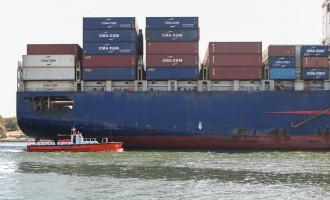Yemen's Houthi group claimed responsibility for the attack on the MSC Darwin ship in the Gulf of Aden and the launch of missiles toward the Israeli city of Eilat.
The Iranian-backed Houthi rebels fired missiles at two commercial vessels in the Red Sea on Tuesday, the first attacks since the US and UK launched strikes against dozens of Houthi targets in Yemen over the weekend.
Trafigura is evaluating the security risks of future Red Sea voyages following an attack on the company's Marlin Luanda oil tanker by Yemen-based Houthi rebels.
A British oil tanker was reported to be engulfed in flames in the Gulf of Aden after Houthi rebels hit it with a missile on Friday after transiting the Red Sea.
The US has put Houthi rebels back on a list of terrorist organizations following the Yemen-based group's attack on another US-operated vessel in the Red Sea region.
The US military launched new strikes in Yemen on Tuesday, targeting anti-ship ballistic missiles in a part of the country controlled by Houthi rebels.
Oil prices jumped 2% on Friday as the United States (US) and Britain launched air and sea strikes in Yemen against the Houthi militants.
Resarch said that the clustered bomb that have been deployed in Yemen were from Britain and is helping to traiin the Saudi forces.
There is still no ceasefire between Yemen and its opponent Houthis. UN continues to record casualties.
Airstrike killing people still continues as the Yemeni President turns down the proposed UN Peace Deal.
Oil rose 3 percent on Tuesday, the most in three weeks, as a weak dollar lifted commodities denominated in the currency and OPEC raised slightly its forecast for world oil demand growth.
Brent crude prices held near a 4-1/2 month high above $65 a barrel on Monday, supported by concerns about fighting in Yemen disrupting Middle East supplies and signs that U.S. shale output may have started to decline.
Crude oil prices settled up 3 percent on Thursday, hitting 2015 highs, while U.S. gasoline reached 5-month peaks after Saudi Arabia and its allies maintained a bombing blitz in Yemen that heightened concerns about the security of Middle East oil supplies.
Brent crude oil steadied around $63 a barrel on Tuesday, not far below the 2015 high, supported by worries that a civil war in Yemen could destabilize the Middle East, affecting oil supplies.
Crude oil rose on Tuesday after a forecast that U.S. shale oil output would record its first monthly decline in more than four years and on tension in Yemen, where top oil exporter Saudi Arabia is embroiled in a civil war.
Subscribe to VCpost newsletter
Most Popular
- Nestle Cuts Sales Forecast as Shoppers Reject Price Hikes
- Social Security Payments Worth Over $4,800 To Go Out This Week; Here’s When You’ll Get Yours
- US Could See Another ‘Great Resignation’ as 3 in 10 Workers Plan To Quit in 2024: Survey
- Uber, Lyft Drivers Remain as Contractors After California Supreme Court Upheld Proposition 22
- Maersk Agrees to Settlement with US Labor Department After Firing Whistleblower
- Walmart Eyes $200 Million Investment in Autonomous Forklifts
- Delta’s CEO Flew to Paris for the Olympics While His Company Is Under Federal Investigation: Report
- Murdoch Empire Family Feud Could Upend the Media Industry, Possibly End Fox News









